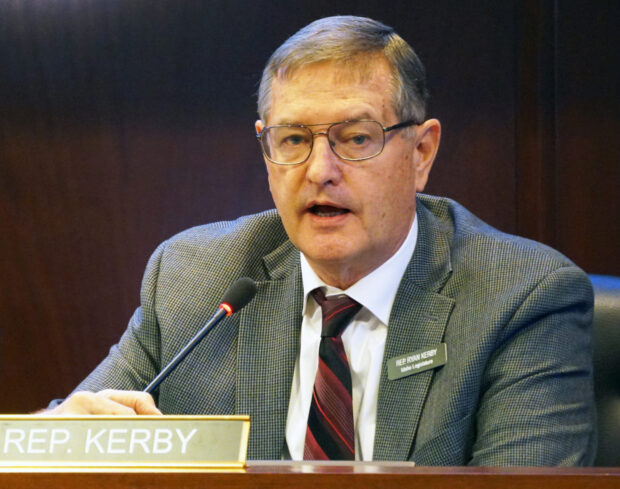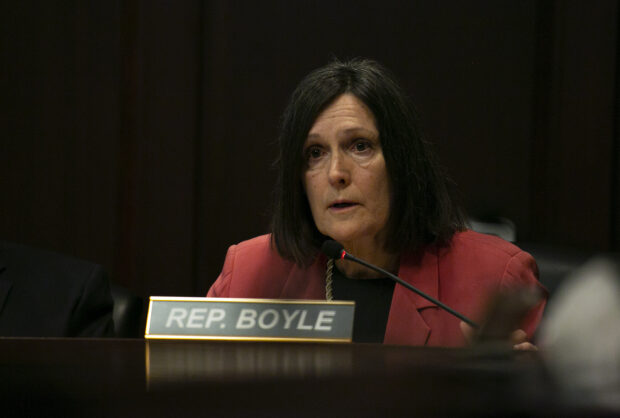The House quickly brought up — and then abruptly set aside — a $46 million all-day kindergarten bill Wednesday.
The House will not vote on the bill until Friday. But the sudden about-face illustrated that one of Gov. Brad Little’s cornerstone K-12 bills has run into trouble on the House floor.
Before putting the vote on hold, the House spent about 20 minutes debating Senate Bill 1373, which would put an additional $46 million into early reading programs. Schools would not be required to use the money to provide all-day kindergarten. However, they could choose to use the money to augment state funding for half-day kindergarten.
SB 1373 sailed through the Senate last week with no real debate, and with only two dissenting votes. But on Wednesday, it quickly became clear that the House is skeptical.
The first warning sign was procedural in nature.

The sponsor, Rep. Ryan Kerby, R-New Plymouth, asked the House to suspend the formal reading of the bill — normally a routine request. Rep. Heather Scott, R-Blanchard, objected, requiring House clerk Carrie Maulin to read the six-page bill aloud.
After the reading came to a close, the debate was heated.
Kerby focused on two selling points:
- He sought to assure House members that SB 1373 would provide property tax relief. Nearly 90% of schools offer some form of all-day kindergarten — with nearly half of the money coming from local, supplemental property tax levies. SB 1373 would alleviate the need to use supplemental levies for kindergarten.
- He also pointed out that SB 1373 would rework the way Idaho distributes $72 million in literacy money. Half of the money would go to schools based on enrollment. But the other half would go to schools based on how many students score at grade level on the Idaho Reading Indicator, or show improvement on the IRI. This is a needed change from the current formula, Kerby said, since schools now receive literacy money based on their number of at-risk readers. “There’s not an incentive to really go out and chase those kids.”
Two conservative Republicans took turns debating against the bill.

Rep. Judy Boyle, R-Midvale, said she could no longer support an all-day kinder bill, since it doesn’t guarantee property tax relief. She has supported other bills that would provide kindergarten funding, but preclude schools from using supplemental levies for kindergarten.
“Are we going to have any property tax relief in this body at all this year?” said Boyle.
Rep. Ron Nate, R-Rexburg, pointed to the state’s languid reading scores — which showed some improvement before the pandemic, but have lost ground since then. The state has been steadily increasing its literacy budget, and Nate questioned whether an additional $46 million would get results.
“I don’t think we need to keep putting more money into a broken system,” he said.
After Nate’s debate, the House went into a short recess. Coming back into session, House Majority Leader Mike Moyle requested a delay on the debate and vote. No lawmaker objected.
After the House adjourned for lunch Wednesday, House Speaker Scott Bedke suggested SB 1373 might have died on the House floor if it had come up for a vote.
“It was in trouble, I believe,” Bedke, R-Oakley, told Idaho Education News. “There was too much confusion.”
One source of confusion: What happens to literacy budgets for schools that do not have the classroom space to offer all-day kindergarten?
In essence, these schools would receive the increased literacy money, to use at their discretion. That means they could keep using the money for any number of purposes, including summer programs, hiring literacy coaches or purchasing new reading curriculum.
In the meantime, the Senate State Affairs Committee is expected to take up a House-passed bill Friday, which addresses some of the House’s property tax questions. House Bill 653 would require districts to disclose how they plan to spend their supplemental levy dollars.
As for the literacy and all-day kindergarten issue, Bedke said the two-day pause is designed to give lawmakers more time to study an important issue, before casting their vote.
“Everybody’s going to take a little pause on this one,” he said.
